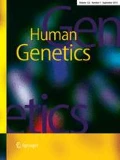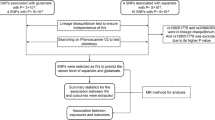Abstract
Catechol-O-methyltransferase (COMT) is an important modulator in the catabolism of extraneural dopamine, which plays an important role in drug reward mechanisms. It is hypothesized that genetic variations in the COMT gene, which can result in a three to fourfold difference in COMT enzyme activity, may be associated with several reward-motivated behaviors. The aim of our study was to examine the relationship between COMT polymorphisms with smoking, obesity and alcohol. Three single nucleotide polymorphisms (SNPs) in COMT were genotyped in 2,371 participants selected randomly from the screening arm of the PLCO Cancer Screening Trial after stratifying by sex, age, and smoking status. Smoking, obesity, and alcohol consumption were assessed by questionnaire. SNP and haplotype associations were estimated using odds ratios (ORs) and 95% confidence intervals (CIs) derived from conditional logistic regression models, adjusted for race/ethnicity. The COMT Ex4-76C > G (Leu136Leu) polymorphism was statistically significantly associated with individuals who had >30% increases in BMI from ages 20 to 50 years, compared to those with 0–5% increase in BMI (0–5%) over the same age period: (CC is referent; ORCG = 1.42, ORGG = 1.46, P trend = 0.06). By sex, the increased risk was further pronounced among females (ORCG = 1.50, ORGG = 2.10, P trend = 0.03). Consistent with our analyses of single polymorphisms, individuals whose BMI increased >30% from ages 20 to 50 years were more likely than individuals with 0–5% increases in BMI to possess COMT haplotypes [COMT Ex3-104C > T–COMT Ex4-76 C > G–COMT Ex4-12 A > G] that included the variant allele for COMT Ex4-76 C > G: C-G-G (T-C-A is referent: ORC-G-G = 1.33, 95% CI 1.01–1.77) and C-G-A (ORC-G-A = 1.79, 95% CI 0.72–4.49). We observed no association between any of the COMT polymorphisms with smoking behavior or alcohol intake. The COMT Ex4-76C > G (Leu136Leu) polymorphism appears to play a role in large increases in BMI. The null association with smoking and alcohol and the pronounced association with increasing BMI among women further implicates COMT’s role in estrogen metabolism as a potentially culpable pathway. Our results support a need for comprehensive evaluation of COMT variations and their functional relevance as COMT may be an important molecular target to evaluate for new treatments regarding obesity.
Similar content being viewed by others
Abbreviations
- BMI:
-
Body mass index
- COMT :
-
Catechol-O-methyltransferase
- PLCO Cancer Screening Trial:
-
Prostate, lung, colorectal, and ovarian
- SNP:
-
Single nucleotide polymorphism
Reference
Barrett J, Fry B, Maller J, Daly M (2005) Haploview: analysis and visualization of LD and haplotype maps. Bioinformatics 21:263–265
Beuten J, Payne TJ, Ma JZ, Li MD (2006) Significant association of catechol-O-methyltransferase (COMT) haplotypes with nicotine dependence in male and female smokers of two ethnic populations. Neuropsychopharmacology 31:675–684
Bouchard C (1992) Etiology of obesity: genetic factors. Arch Latinoam Nutr 42:127S–130S
Bouchard C, Perusse L (1993) Genetic aspects of obesity. Ann N Y Acad Sci 699:26–35
Bray NJ, Buckland PR, Williams NM, Williams HJ, Norton N, Owen MJ, O’Donovan MC (2003) A haplotype implicated in schizophrenia susceptibility is associated with reduced COMT expression in human brain. Am J Hum Genet 73:152–161
Calle EE, Thun MJ (2004) Obesity and cancer. Oncogene 23:6365–6378
Carmelli D, Swan GE, Robinette D, Fabsitz R (1992) Genetic influence on smoking—a study of male twins. N Engl J Med 327:829–833
Colilla S, Lerman C, Shields PG, Jepson C, Rukstalis M, Berlin J, DeMichele A, Bunin G, Strom BL, Rebbeck TR (2005) Association of catechol-O-methyltransferase with smoking cessation in two independent studies of women. Pharmacogenet Genomics 15:393–398
Dick DM, Foroud T (2003) Candidate genes for alcohol dependence: a review of genetic evidence from human studies. Alcohol Clin Exp Res 27:868–879
Enoch MA, Xu K, Ferro E, Harris CR, Goldman D (2003) Genetic origins of anxiety in women: a role for a functional catechol-O-methyltransferase polymorphism. Psychiatr Genet 13:33–41
Garris PA, Wightman RM (1995) Distinct pharmacological regulation of evoked dopamine efflux in the amygdala and striatum of the rat in vivo. Synapse 20:269–279
Hallikainen T, Lachman H, Saito T, Volavka J, Kauhanen J, Salonen JT, Ryynanen OP, Koulu M, Karvonen MK, Pohjalainen T, Syvalahti E, Hietala J, Tiihonen J (2000) Lack of association between the functional variant of the catechol-O-methyltransferase (COMT) gene and early-onset alcoholism associated with severe antisocial behavior. Am J Med Genet 96:348–352
Hatchell PC, Collins AC (1980) The influence of genotype and sex on behavioral sensitivity to nicotine in mice. Psychopharmacology (Berl) 71:45–49
Hayes RB, Sigurdson A, Moore L, Peters U, Huang WY, Pinsky P, Reding D, Gelmann EP, Rothman N, Pfeiffer RM, Hoover RN, Berg CD (2005) Methods for etiologic and early marker investigations in the PLCO trial. Mutat Res 592:147–154
Horowitz R, Kotler M, Shufman E, Aharoni S, Kremer I, Cohen H, Ebstein RP (2000) Confirmation of an excess of the high enzyme activity COMT val allele in heroin addicts in a family-based haplotype relative risk study. Am J Med Genet 96:599–603
Ishiguro H, Haruo ST, Toru M, Saito T, Arinami T (1999) Association study between high and low activity polymorphism of catechol-O-methyltransferase gene and alcoholism. Psychiatr Genet 9:135–138
Mannisto PT, Kaakkola S (1999) Catechol-O-methyltransferase (COMT): biochemistry, molecular biology, pharmacology, and clinical efficacy of the new selective COMT inhibitors. Pharmacol Rev 51:593–628
Malaiyandi V, Sellers EM, Tyndale RF (2005) Implications of CYP2A6 genetic variation for smoking behaviors and nicotine dependence. Clin Pharmacol Therapeut 77:145–158
McGue M (1999) Phenotyping alcoholism. Alcohol Clin Exp Res 23:757–758
Mokdad AH, Marks JS, Stroup DF, Gerberding JL (2004) Actual causes of death in the United States, 2000. JAMA 291:1238–1245
Morton LM, Wang SS, Chatterjee N, Bergen AW, Kvale P, Welch R, Yeager M, Hayes RB, Chanock SJ, Caporaso NE (2006) Genetic variation in dopamine receptor D2 (DRD2) in relation to smoking and obesity in the prostate, lung, colorectal, and ovarian (PLCO) cancer screening trial. Pharmacogenet Genomics 16:901–910
Need AC, Ahmadi KR, Spector TD, Goldstein DB (2006) Obesity is associated with genetic variants that alter dopamine availability. Ann Hum Genet 70:293–303
Packer BR, Yeager M, Staats B, Welch R, Crenshaw A, Kiley M, Eckert A, Beerman M, Miller E, Bergen A, Rothman N, Strausberg R, Chanock SJ (2004) SNP500Cancer: a public resource for sequence validation and assay development for genetic variation in candidate genes. Nucleic Acids Res 32:D528–D532
Prorok PC, Andriole GL, Bresalier RS, Buys SS, Chia D, Crawford ED, Fogel R, Gelmann EP, Gilbert F, Hasson MA, Hayes RB, Johnson CC, Mandel JS, Oberman A, O’Brien B, Oken MM, Rafla S, Reding D, Rutt W, Weissfeld JL, Yokochi L, Gohagan JK (2000) Design of the prostate, lung, colorectal and ovarian (PLCO) cancer screening trial. Control Clin Trials 21:273S–309S
Redden DT, Shields PG, Epstein L, Wileyto EP, Zakharkin SO, Allison DB, Lerman C (2005) Catechol-O-methyl-transferase functional polymorphism and nicotine dependence: an evaluation of nonreplicated results. Cancer Epidemiol.Biomarkers Prev 14:1384–1389
Shifman S, Bronstein M, Sternfeld M, Pisante-Shalom A, Lev-Lehman E, Weizman A, Reznik I, Spivak B, Grisaru N, Karp L, Schiffer R, Kotler M, Strous RD, Swartz-Vanetik M, Knobler HY, Shinar E, Beckmann JS, Yakir B, Risch N, Zak NB, Darvasi A (2002) A highly significant association between a COMT haplotype and schizophrenia. Am J Hum Genet 71:1296–1302
Stein MB, Fallin MD, Schork NJ, Gelernter J (2005) COMT polymorphisms and anxiety-related personality traits. Neuropsychopharmacology 30:2092–2102
Tiihonen J, Hallikainen T, Lachman H, Saito T, Volavka J, Kauhanen J, Salonen JT, Ryynanen OP, Koulu M, Karvonen MK, Pohjalainen T, Syvalahti E, Hietala J (1999) Association between the functional variant of the catechol-O-methyltransferase (COMT) gene and type 1 alcoholism. Mol Psychiatry 4:286–289
True WR, Heath AC, Scherrer JF, Waterman B, Goldberg J, Lin N, Eisen SA, Lyons MJ, Tsuang MT (1997) Genetic and environmental contributions to smoking. Addiction 92:1277–1287
Tunbridge EM, Bannerman DM, Sharp T, Harrison PJ (2004) Catechol-O-methyltransferase inhibition improves set-shifting performance and elevates stimulated dopamine release in the rat prefrontal cortex. J Neurosci 24:5331–5335
Uhl GR, Vandenbergh DJ, Rodriguez LA, Miner L, Takahashi N (1998) Dopaminergic genes and substance abuse. Adv Pharmacol 42:1024–1032
Wang T, Franke P, Neidt H, Cichon S, Knapp M, Lichtermann D, Maier W, Propping P, Nothen MM (2001) Association study of the low-activity allele of catechol-O-methyltransferase and alcoholism using a family-based approach. Mol Psychiatry 6:109–111
Author information
Authors and Affiliations
Corresponding author
Rights and permissions
About this article
Cite this article
Wang, S.S., Morton, L.M., Bergen, A.W. et al. Genetic variation in catechol-O-methyltransferase (COMT) and obesity in the prostate, lung, colorectal, and ovarian (PLCO) cancer screening trial. Hum Genet 122, 41–49 (2007). https://doi.org/10.1007/s00439-007-0374-7
Received:
Accepted:
Published:
Issue Date:
DOI: https://doi.org/10.1007/s00439-007-0374-7




